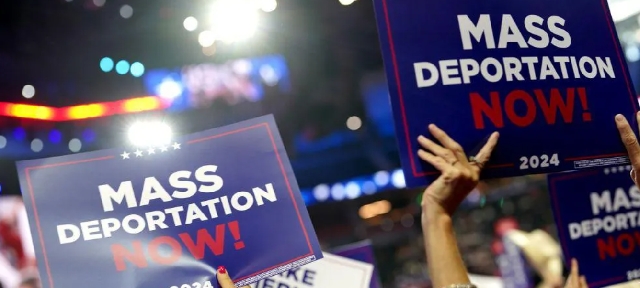Trump says 'no price tag' for mass deportations
 Calls to remove huge numbers of migrants are a fixture at Trump campaign events
Calls to remove huge numbers of migrants are a fixture at Trump campaign events
US President-elect Donald Trump has doubled down on his campaign promise of the mass deportation of illegal immigrants, saying the cost of doing so will not be a deterrent.
In some of his first public remarks since winning the election, Trump said his priority upon taking office in January would be to make the border “strong and powerful".
"It’s not a question of a price tag. It’s not - really, we have no choice," Trump told NBC News.
"When people have killed and murdered, when drug lords have destroyed countries, and now they’re going to go back to those countries because they’re not staying here. There is no price tag."
While his campaign has given various answers as to how many could be removed, his vice-president-elect JD Vance had said they would start with one million.
In Thursday’s phone interview with NBC, Trump partially credited his message on immigration as a reason he won the race.
"They want to have borders, and they like people coming in, but they have to come in with love for the country," he said. "They have to come in legally."
Experts say there are significant legal and practical challenges to expelling so many people at once.
Immigration advocates have also warned that the human cost of deportations would be significant, with families torn apart and raids taking place in communities and workplaces across the US.
What are the legal challenges?
The latest figures from the Department of Homeland Security and Pew Research indicate that there are around 11 million undocumented immigrants currently living in the US, a number that has remained relatively stable since 2005.
Most are long-term residents - nearly four-fifths have been in the country for more than a decade.
Immigrants who are in the country without legal status have the right to due process, including a court hearing before their removal. A drastic increase in deportations would likely entail a large expansion in the immigration court system, which has been beset by backlogs.
Most immigrants already in the country enter into the deportation system not through encounters with Immigration and Customs Enforcement (Ice) agents but through local law enforcement.
However, many of the country’s largest cities and counties have passed laws restricting local police co-operation with Ice.
Trump has pledged to take action against these “sanctuary cities”, but America’s patchwork of local, state and federal laws further complicates the picture.
Kathleen Bush-Joseph, a policy analyst at the Washington-based Migration Policy Institute, or MPI, said that co-operation between Ice and local officials would be a "critical" aspect of any mass deportation programme.
"It's much easier for Ice to pick someone up from a jail if local law enforcement co-operates, instead of having to go look for them," she said.
As an example, Ms Bush-Joseph pointed to an early August declaration from the sheriff's offices of Florida's Broward and Palm Beach counties, in which they said they would not deploy deputies to help any mass deportation plan.
"There are many others who would not co-operate with a Trump mass deportation plan," she said. "That makes it so much harder."
Any mass deportation programme is also likely to be almost immediately met with a flurry of legal challenges from immigration and human rights activists.
A 2022 Supreme Court ruling, however, means that courts cannot issue injunctions on immigration enforcement policies - meaning they would continue even as the challenges work their way through the legal system.
Source: BBC
Trending World

Trump signs executive order to withdraw US from World Health Organization
03:38
Death toll rises to 98 from gasoline tanker blast in central Nigeria
01:16
What happens on moving day at White House?
01:11
Democratic-led states sue to block Trump's birthright citizenship order
13:25
Trump promises global businesses lower taxes for products made in US, tariffs if not
00:23
Botswana closes doors on foreign teachers, truck drivers
02:16
Trump to Putin: End 'ridiculous' war against Ukraine
01:52
Trump revokes humanitarian parole for migrants from 4 countries
01:48
Pentagon will send up to 1,500 active-duty troops to help secure US-Mexico border
01:41
Trump makes 'two sexes' official and scraps DEI policies
01:36



